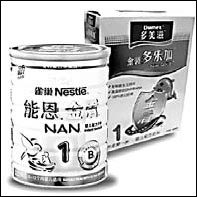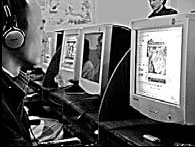

Patent and brand expo
The Fourth China International Patent and Famous Brand Expo was recently held in Suzhou, capital of East China's Jiangsu province.
The Expo had 716 booths in a 5,000 sq m exhibition, a 42 percent increase over the previous event. Thousands of patent technologies and branded products were exhibited.
Representatives from more than 20 provinces, municipalities and autonomous regions and seven countries and regions, including the United States, Australia and South Korea took part in the event.
The expo held five meetings emphasizing the partnership of industry and university research to advance the transfer of scientific and technological achievements.
Sino-UK innovation program
The first UK-China collaboration program, called Innovation China UK (ICUK), was launched in London recently in a bid to promote joint innovation and knowledge transfer between the two countries.
ICUK integrates five British and more than 10 Chinese higher education institutions to support academic and business partnerships, fund research and commercialize joint intellectual property between the UK and China.
"I welcome the launch of ICUK because of its emphasis on helping bring ground-breaking research to the commercial market. It is also a further sign of cooperation between the two countries," British Science and Innovation Minister Ian Pearson said at the inauguration ceremony.
Kiwifruit dispute
A New Zealand kiwifruit marketing company took a Jiangsu Province fruit trading company to court, accusing it of trademark infringement and asking for 300,000 yuan in compensation.
Shanghai No 1 Intermediate People's Court heard the case yesterday. A verdict is pending.
New Zealand Zespri Group Ltd, the world's largest kiwifruit marketing company, sells the fruit in about 70 countries and regions. It entered the mainland market in 1998 and registered its trademark as Zespri with a logo showing sunbeams.
But company officials say they found a similar trademark and logo on kiwifruit sold by Xishu Fruit Trading Co in the local market earlier this year.
They reported the case to Shanghai Administration of Industry and Commerce, as Xishu's fruit bore the trademark Znishio and a similar sunbeam logo. The watchdog seized about 100 crates of fruit and labels.
Zespri told the court that Xishu then continued selling the fruit with the similar trademark, which also appeared on its website.
Nestle sues Numico

Beijing No 1 People's Court recently heard trademark violation and unfair competition allegations by Nestle against Numico, the maker of Dumex baby diary products.
Nestle's attorney sought damages to be determined by the court as the company had been unable to determine the actual profits of the defendant.
Nestle's attorney testified its Shield logo was registered at the Trademark Office of the State Administration for Industry and Commerce on February 22, 2006. Numico's logo Jindun (meaning Golden Shield), the registration of which is pending, has been used on a large quantity of products.
The plaintiff said the defendant used a logo with a similar shape to its own Shield brand in a prominent spot on the packaging for the Dumex Mamil Gold line of products as well using the words Jindun. In addition, the defendant also used Jindun in its marketing and advertising materials.
In response, Numico's attorney denied all trademark infringement or unfair competition allegations and presented 40 rebuttals.
The court has not yet rendered a decision.
Internet cafe in court

Five United States movie studios have filed a suit against a Beijing online movie provider and a Shanghai Internet cafe for copyright infringement and are seeking more than 3.2 million yuan compensation.
Columbia Pictures Corp, Universal City Studios, 20th Century Fox Film Corp, Paramount Pictures Corp and Disney Enterprises Inc allege that the Internet cafe installed software developed by the operator of Jeboo.com and broadcast the films without the approval of the studios.
The Internet cafe offered 13 movies, including Night at the Museum, X-Men United and Pirates of the Caribbean, the movie makers said.
Jeboo.com, which claims to be the biggest provider of authorized movies online in China, was sued for enabling the cafe to infringe on copyrights.
In addition to compensation, the studios are calling on the defendants to immediately cease the practice and make a public apology.
"All the audio and video products on Jeboo.com are provided by our partners. Jeboo.com has the right to provide download services through the Internet for them according to contracts signed between Jeboo.com and our partners," said Jeboo.com in a statement.
'Dragon Boat' effort
Chinese customs authorities have stepped up their efforts in intellectual property right (IPR) protection by launching a five-month nationwide campaign on October 1.
The campaign named "Dragon Boat" was the largest IPR protection effort by customs agencies in recent years, according to the General Administration of Customs.
Customs across the country uncovered some 433 cases of IPR infringement, or about 14 cases a day, in only one month after the action began, an increase of 57 percent from a year earlier.
The campaign mainly targets IPR-infringing products exported through shipping channels and the mail to the United States, the European Union, Hong Kong and the United Arab Emirates.
In October, customs authorities in the eastern Chinese city of Hangzhou uncovered 23 infringement cases and seized 32,800 fake Louis Vuitton, Nokia and Adidas products.
On November 5, a man was detained at Beijing Capital International Airport after he was found with nearly 2,000 counterfeit wristwatches bearing Patek Philippe, Vacheron Constantin and Rolex trademarks.
Haier questions GE design
Only seven months after the global introduction of its new free-standing side-by-side refrigerator, Chinese home goods giant Haier said it had found similar design from US-based General Electric on Bestbuy.com. The firm said the two models share almost the same appearance and size of the freezer compartment.
Guan Enhua, the product manager of the US division of Haier, said the firm will deal with the issue of intellectual property rights according to relevant regulations.
He declined to reveal if the Chinese company will take legal action against the suspicious product.
"If it meets market demand, Haier considers it a contribution to American consumers," he said.
Industry experts point out that it might be a good trend if domestic products are noticed and studied by international giants.
Haier recently developed the new design and put the freezer in the upper part of the refrigerator compartment in a move to meet the living style of US consumers.
As the fourth-biggest large home white appliance manufacturer in the world, Haier achieved more than 100 billion yuan in turnover in the global market last year.
The second-largest refrigerator maker worldwide, Haier's business has now expanded to 16 countries and regions.
(China Daily 12/08/2007 page9)













